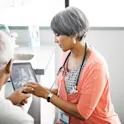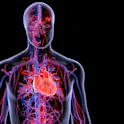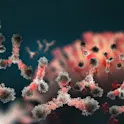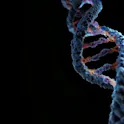
Health
12 Sep 2024
Kids in families with too much screen time struggle with language skills
Scientists find that children whose families use screens a lot have weaker vocabulary skills — and videogames have the biggest negative effect.

Health
12 Sep 2024
Scientists find that children whose families use screens a lot have weaker vocabulary skills — and videogames have the biggest negative effect.

Health
06 Sep 2024
Researchers found that exposure to outdoor light at night could increase Alzheimer’s prevalence more than many other risk factors for people aged under 65

Health
04 Sep 2024
At Frontiers, we bring some of the world’s best research to a global audience. But with tens of thousands of articles published each year, it’s impossible to cover all of them. Here are just five amazing papers you may have missed.

Health
30 Aug 2024
Researchers from Finland and Norway developed a new suite of methods for the screening of antivirulence activity of unknown compounds of bacterial origin. The compounds tested had been derived from actinobacteria living inside invertebrates in the Arctic Sea. They found two interesting compounds with strong antivirulence or antibacterial effects against enteropathogenic E. coli. These results demonstrate the potential of prospecting novel habitats for promising new antibacterial drugs, to solve the current global antibiotics crisis.

Health
23 Aug 2024
Researchers from Argentina compared semen quality between men infected with high-risk (HR-HPV) and low-risk (LR-HPV) genotypes of human papillomavirus and HPV negative men. They showed that HR-HPV positive men had higher percentages of dead sperm, a higher level of reactive oxygen species, and a lower count of white blood cells in their semen. These results suggest that HR-HPV positive men, but not LR-HPV positive men, may have lower fertility due to oxidative damage to sperm.

Health
16 Aug 2024
Scientists find that taking part in creative activities boosts people’s sense that life is worthwhile, their happiness, and their satisfaction with life.

Health
08 Aug 2024
Researchers have measured the diversity of microbes inside microwaves for the first time. They showed that microwaves harbor a specialized community of locally adapted microbial genera, which resembles that reported on kitchen surfaces and in another extreme, highly irradiated habitat: on solar panels. This finding has potential biotechnological applications, in processes that require microbes resistant to thermal shock, radiation, and desiccation.

Health
26 Jul 2024
Researchers from the US analyzed replies to the Health Information National Trends Survey and found that doctors are more trusted than scientists and especially government health agencies. The results revealed that perceived uncertainty in health recommendations, inherent in the scientific process, tends to confuse the public and undermine its trust in experts apart from doctors. This implies that doctors are best placed to communicate changes in recommendations, to ensure better health and restore trust in agencies.

Health
25 Jul 2024
Researchers assessed the impact of commonly used agricultural pesticides on cancer incidence and found that pesticide use is associated with increased cancer risk

Health
02 Jul 2024
Our sense of touch is generally thought to decline with age, just like the other senses. However, a study has now shown for the first time that age-related decline in sensitivity only happens in hairless skin like the tip of the index finger, but not in the hairy cheeks and forearms. The authors speculate that the exceptional sensitivity of the cheeks throughout life is due to our evolutionary history as social primates, for whom touch is an important method of communication.

Health
19 Jun 2024
Conventional drug delivery is inefficient and imprecise. Through a series of preclinical experiments, researchers from the University of Utah have optimized a novel, targeted method of delivery through nanodroplet carriers, which are triggered to release their drug at exactly the desired spot by a focused beam of ultrasound. Their results showed that nanodroplets with a core of perfluorooctylbromide are stable, efficient in delivery, and well tolerated. Clinical experiments are likely to follow.

Health
23 May 2024
Digital medicine and medical AI pioneer Dr Eric Topol will address thousands of researchers and policy makers from around the world on June 12, highlighting the transformative potential of digital technologies on medicine and healthcare.

Health
23 May 2024
The Covid-19 pandemic changed medicine forever – now scientists reveal a bold new vision for the healthcare of the future.

Health
25 Apr 2024
It’s long been known that depression and cardiovascular disease are somehow related, though exactly how remained a puzzle. Now, researchers have identified a ‘gene module’ consisting of 256 functionally related, co-expressed genes, which is part of the developmental program of both diseases. These genes can now be used as biomarkers for both depression and cardiovascular disease, and could ultimately help to find new drugs to target both.

Health
25 Apr 2024
Scientists champion global genomic surveillance using latest technologies and a ‘One Health’ approach to protect against novel pathogens like avian influenza and antimicrobial resistance, catching epidemics before they start.
Get the latest research updates, subscribe to our newsletter